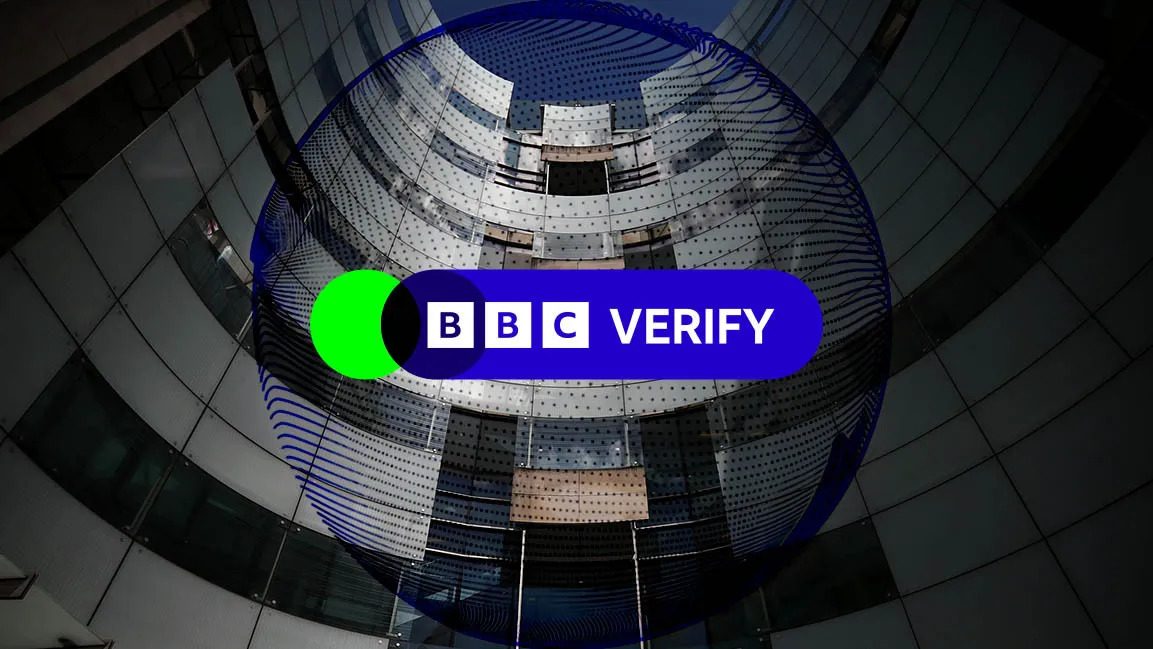The crisis at the BBC has now blown up into a very public argument over its future, one that involves everyone from the once taciturn BBC lifers to a litigious Donald Trump. But at the centrepiece of this struggle, internally, is the ongoing controversy around BBC Verify, the set piece of the outgoing CEO of BBC News Deborah Turness and her efforts to bring the broadcaster into the 21st century.
For all the fanfare of its launch, it has since come to embody the crisis of competence, poor management and, above all, a generational divide between older and younger staff. Just two years old, it’s also one that seems to have been founded on a set of increasingly redundant beliefs about how public interest broadcasting should work in the digital age.
Set aside in its own special area in the newsroom, the 60-strong unit was conceived as the new face of the BBC: one committed to transparency and facts and fighting dodgy narratives and disinformation. Despite this, its selection and presentation of stories always seems to betray a curious suspicion of both the intelligence and priorities of its own audience.
None of this lofty authority has been helped by its track record of getting things wrong and quietly retracting them. An UnHerd investigation from last November found that 5% of the stories since its launch had to be corrected, clarified or withdrawn.
Internally, BBC Verify has never been popular. Insiders paint a picture of a siloed, clunky unit whose advanced, agenda-setting OSINT capabilities never really transpired. “It’s become a subject of a good deal of cynicism in the organisation,” one BBC veteran told me, on the condition of anonymity. “The productivity is low, the staff and budget is substantially bigger than the pre-cut version of Newsnight, yet it never seems to lead the news agenda.” Others I spoke to were more pointed in their criticism: “What the fuck do they think the rest of us are doing all the time, if not verifying the journalism we’re publishing?”
Founded in 2024, Verify has already come to be both a product and a victim of a bygone era. Go to any “future of news” conference and they will tell you that news has a product problem. The old broadcasting service, shorn of its old monopoly, had to be marketed in a new way. Audiences had to be reminded of the importance of public interest journalism. Between 2016 and roughly 2023, the wisdom transpired that the most effective means of restoring trust was to lead a crusade against “disinformation”. This was essentially a commercial and political fight by the old 20th-century media monopolies against rising populism and its new media.
Turness, in keeping with the post-pandemic panic around misinformation, pronounced that “seeing was no longer believing”, as words like AI and disinformation were jumbled together. Upon those old Reithan principles of “inform, educate and entertain”, a new principle emerged: fight misinformation.
The misinformation complex has since significantly wound down in terms of both resources and reputation. Fact-checking and counter-misinformation operations are levelling off and once again integrated into standard reporting, while those who argue that is a poor way to both counter false information and influence the news agenda appear to be winning the argument.
After all, the world they once bravely set out to rid of pesky misinformation now looks very different. In 2023, prior to the now notorious intervention by Bill Gates, an apocalyptic narrative around climate change was prolific while institutions could still deflect their poor handling of pandemic to a veritable moral panic around the rise of conspiracism. Britain meanwhile was preparing for the apparent restoration of centre-left sanity and stability in which the Overton window was safe from populist hands around issues like Net Zero and immigration.
That world never transpired. And in this new era, the BBC Verify product still being flogged is one that looks increasingly archaic. As of writing, the page is a hodgepodge of a four-minute Ros Atkins explainer on “How the BBC works”, a piece showing how many buildings Israel has destroyed in Gaza since the ceasefire, and a standard write up of the Huntingdon train attack.
Frustrations by insiders reveal what could come next. Many desire a return to an old school news operation built around agenda setting stories, shorn of glossy marketing gimmicks like Verify. The initiative was also seen as a cost saving measure, a means to slim down the newsroom and lead its “digital first” operations that involve less on the ground reporting. As one insider put it “Verify was an attempt to make the news without ever having to leave the office.
But leaving the office — sending journalists out into the real world — is one of the last things organisations like the BBC still offer. Old school news gathering and investigations are expensive and complex, but still necessary when done properly. Before the crisis, the BBC had made splashes with its investigation into organised crime networks operating on Britain’s high streets that prompted action by the Home Office and the National Crime Agency. This is what the national broadcaster should be aiming at.
Changing the culture at an organisation can be a decades-long endeavour, and the reality is that if Reform UK wins the next election, the Beeb will have to fight for its life. A quick win for the next Director General would be to axe Verify and publicly devote resources to telling stories that actually resonate in 21st century Britain.

